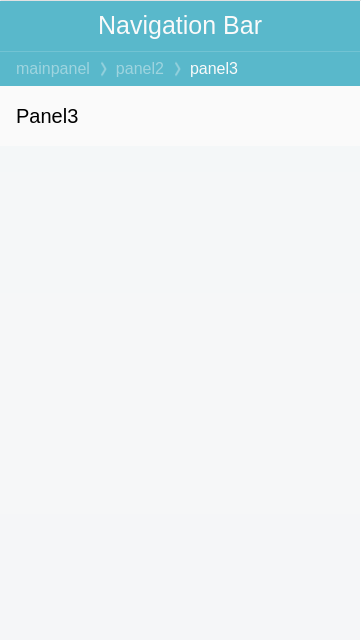Navigation
The navigation component is used inside the header to navigate back and forth according to the navigational history array, which is created by the application. By clicking a horizontally-listed element on the navigation, you can move to the target page.
| Note |
|---|
| This component is supported since Tizen 2.3. |

Table of Contents
Default Selector
Make the navigation component with the class="ui-navigation" or data-role="navigation" attribute. For semantic understanding, use the nav element.
<div class="ui-page">
<div class="ui-header" data-position="fixed">
<h1>title</h1>
<nav class="ui-navigation" id="navigation"></nav>
</div>
<div class="ui-content"></div>
</div>
HTML Examples
| Note |
|---|
| To get more efficient experience, aWe recommend to use Navigation component with PanelChanger. |
HTML example with PanelChanger
<div id="panelPage" class="ui-page">
<div class="ui-header" data-position="fixed">
<h1>Navigation</h1>
<nav id="navigation" class="ui-navigation">
</nav>
</div>
<div class="ui-content">
<div id="panelChanger" class="ui-panel-changer">
<div id="mainpanel" class="ui-panel">
<a href="#panel2">Go Panel 2</a>
</div>
</div>
</div>
<script src="./panel.js"></script>
</div>
<!--panel.html-->
<div id="panel2" class="ui-panel">
<div class="ui-content">
<ul class="ui-listview">
<li class="ui-li-anchor">
<a href="#panel3">Go Panel 3</a>
</li>
</ul>
</div>
</div>
<div id="panel3" class="ui-panel">
<div class="ui-content">
<ul class="ui-listview">
<li class="ui-li-anchor">
<a>Panel3</a>
</li>
</ul>
</div>
</div>
JS example with PanelChanger
/* panel.js */
(function()
{
var page = document.querySelector("#panelPage"),
panelChanger = page.querySelector("#panelChanger"),
panelChangerComponent,
navigation = page.querySelector("#navigation"),
navigationComponent,
navigated = false;
page.addEventListener("pagebeforeshow", function()
{
var activePanel = page.querySelector(".ui-panel-active");
panelChangerComponent = tau.widget.PanelChanger(panelChanger);
navigationComponent = tau.widget.Navigation(navigation);
navigationComponent.push(activePanel.id);
});
panelChanger.addEventListener("panelchange", function(event)
{
var toPanel = event.detail.toPanel,
direction = event.detail.direction,
id = toPanel.id;
if (id)
{
if (direction === "forward")
{
navigationComponent.push(id);
}
else
{
if (navigated === false)
{
navigationComponent.pop();
}
else
{
navigated = false;
}
}
}
else
{
console.warn("You should insert id value in the each panels")
}
});
navigation.addEventListener("navigate", function(event)
{
var id = event.detail.id;
navigated = true;
panelChangerComponent.changePanel("#" + id, "slide-reverse", "back");
});
})();
Methods
Summary
| Method | Description |
|---|---|
create() |
Initiates the making of the navigation. |
push(String targetId) |
Add navigation item only one at a time. |
pop() |
Pop last child of navigation. |
create :DEPRECATED since 2.4-
Initiates the making of the navigation.
create()
push-
Add navigation item only one at a time.
push(String targetId)
Parameters:
Parameter Type Required / optional Description targetId String required element id to be added Return value:
No return valueCode example:
HTML code:
<div class="ui-header" data-position="fixed"> <h1>Navigation</h1> <nav id="navigation" class="ui-navigation"> </nav> </div> <div class="ui-content"> <div id="panelChanger" class="ui-panel-changer"> <div id="mainpanel" class="ui-panel" style="background-color:#ffff4f"> <a href="./panel.html#panel2">Go Panel 2</a> </div> </div> </div>JS code:
var navigation = page.querySelector("#navigation"), activePanel = page.querySelector(".ui-panel-active"), navigationComponent = tau.widget.Navigation(navigation); navigationComponent.push(activePanel.id);
pop-
Pop last child of navigation.
pop()
Return value:
No return valueCode example:
HTML code:
<div class="ui-header" data-position="fixed"> <h1>Navigation</h1> <nav id="navigation" class="ui-navigation"> </nav> </div>
JS code:
var navigation = page.querySelector("#navigation"), navigationComponent = tau.widget.Navigation(navigation); navigationComponent.pop();